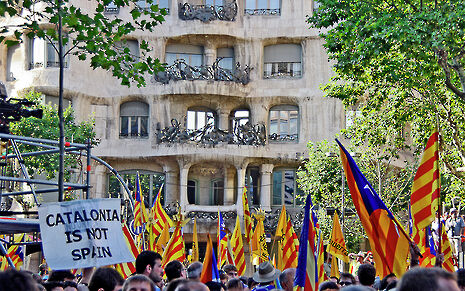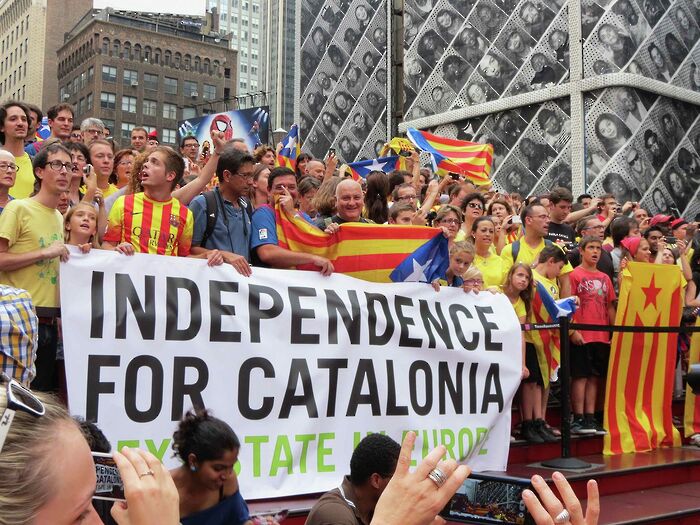Catalan secessionism is no freedom fight: it’s an ethnicist and supremacist struggle
Responding to an article published in Varsity, Guillermo Íñiguez defends the central Spanish government, and argues for constitutional obedience

Tom Hinch’s article on April 9th, illuminating as it is, contains one fatal flaw: it relies on a series of stereotypes, half-truths and factual inaccuracies to portray the Catalan crisis as a conflict between a force of Spanish Death Eaters, led by a “politicised” judiciary and a monarch resembling both Big Brother and Lord Voldemort, and an army of Catalan freedom fighters.
Hinch’s article starts by comparing the 2017 Catalan referendum with the Scottish 2014 one. Why this is based on a fundamental error was analysed in an earlier Varsity article. while the British constitution requires a simple Parliamentary majority to substantially modify it, the Spanish one does not, laying out a longer (yet by no means impossible) amendment procedure. The oft-forgotten difference between the Scottish and the Catalan referenda therefore lies in their legality: the former was carried out in accordance with the UK’s constitutional arrangements, while the aim of the latter was to call for an illegal referendum with the hope of leading to a de facto independence which would force the Spanish government to concede defeat.
“The difference between reality (a prosecution for actions with political consequences) and Hinch’s narrative (a prosecution for ideas) is as blatant as it is important when properly assessing the Catalan crisis”
This analysis is followed by a rather surprising statement: “Spain may claim that it is simply ‘upholding the law’ in Catalonia; however, this means very little”. The need for Spain as a whole to vote on Catalan secession, he writes, can be best compared to a husband telling his wife she cannot divorce him without his consent – an undoubtedly creative analogy, albeit not helpful when seeking to understand Spain’s constitution. Unlike the UK, Spain’s constitutional framework is based on the country’s “indissoluble unity” and on a “national sovereignty” belonging to “the Spanish people” as a whole. France, Italy, Germany, Norway, Switzerland and Brazil all contain similar clauses, as does the jurisprudence of the USA in Texas v White, where it was held that that the federation is “indissoluble” and “perpetual”. As recently as 2016, the German Constitutional Court struck down a secessionist referendum in Bavaria, arguing that the sovereignty of the German state rested on the German people as a whole, not on individual Länder, thus leaving no room for actions clashing with the country’s constitutional order. This comparative legal analysis, if Hinch’s narrative were to be followed, would lead to the rather worrying conclusion that all the countries above are, due to their failure to recognise domestic secessionist movements, “autocratic”.
Carles Puigdemont and the other prosecuted politicians are not political prisoners – that is, people targeted because of their political beliefs. Spain, a member of the EU and the Council of Europe, does not have political prisoners. Puigdemont and his fellow defendants are being prosecuted for something radically different: the crime, among others, of “rebellion”, enshrined in Article 472(5) of Spain’s Criminal Code and, in different forms, in those of Germany, France and Belgium. Yet again, the difference between reality (a prosecution for actions with political consequences) and Hinch’s narrative (a prosecution for ideas) is as blatant as it is important when properly assessing the Catalan crisis.
Violence, an essential element of the aforementioned crime of rebellion, takes many forms, encompassing more than mere physical damage. Many of these, as Joaquim Coll explains, have been present in the secessionist movement’s actions. Relying on a dubious social majority (no pro-independence coalition since 2012 has obtained more than 48% of votes and 52% of MPs) to impose one’s political views and intimidate and verbally assault dissenters is violent. Using a region’s police force, Parliament, publicly-funded media and government departments to pursue a secessionist agenda is violent. Repeatedly and openly calling for disobedience against a country’s Constitutional Court, fully aware of such actions’ violent potential, is violent, as is advocating for any necessary measures, including “personal sacrifices” (sic), to ensure independence. And, if nothing else is, the 300 instances of physical violence reported by the Spanish police definitely are.
Catalan secessionism is no freedom fight and Catalan leaders are no martyrs. It is an ethnicist and supremacist fight, one of “us” against “them” which holds its dissenters and the Spanish constitution in utter disregard. Both the EU and its member states ought to cast their minds back to the dangers of giving the benefit of doubt to movements which, claiming to represent das Volk, have held themselves to be above the Rechtsstaat. In the same way, relying on stereotypes, empty phrases and factual inaccuracies to question the legitimacy and impartiality of Spain’s judiciary is not only dangerous; it also ignores the conflict’s wider social, political and constitutional realities, as well as the dangers of turning, as Hinch himself writes, “a blind eye to Catalonia”.
 News / Caius mourns its tree-mendous loss23 December 2025
News / Caius mourns its tree-mendous loss23 December 2025 Comment / Yes, I’m brown – but I have more important things to say22 December 2025
Comment / Yes, I’m brown – but I have more important things to say22 December 2025 News / Cambridge welcomes UK rejoining the Erasmus scheme20 December 2025
News / Cambridge welcomes UK rejoining the Erasmus scheme20 December 2025 News / CUP announces funding scheme for under-represented academics19 December 2025
News / CUP announces funding scheme for under-represented academics19 December 2025 Interviews / Politics, your own way: Tilly Middlehurst on speaking out21 December 2025
Interviews / Politics, your own way: Tilly Middlehurst on speaking out21 December 2025










